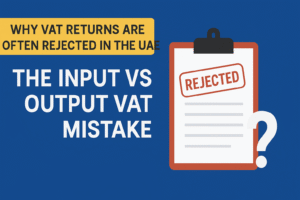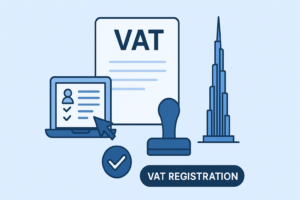Corporate tax in the UAE is one of the most significant financial developments for businesses in recent years. Known for its historically tax-free environment, the UAE introduced a federal corporate tax to align with global standards and ensure sustainable economic growth. Whether you run a small enterprise or a multinational company, understanding corporate tax is essential for compliance and smart financial planning.
What Is Corporate Tax in the UAE?
Corporate tax is a direct tax imposed on the net income or profit of corporations and other business entities. The UAE introduced its corporate tax regime under Federal Decree-Law No. 47 of 2022, which took effect on June 1, 2023.
The corporate tax applies to businesses operating across the UAE, including free zones, with certain exemptions and special provisions to support small businesses and encourage foreign investment.
Corporate Tax Rate in the UAE
The UAE corporate tax rate is designed to remain competitive globally:
- 0% on taxable income up to AED 375,000 (to support small businesses and startups).
- 9% on taxable income exceeding AED 375,000.
- Different rates may apply to large multinational corporations that fall under the OECD’s Pillar Two framework (earning global profits above EUR 750 million).
This low tax rate makes the UAE one of the most business-friendly countries in the world.
Who Is Subject to Corporate Tax in the UAE?
Corporate tax applies to:
- UAE companies and other legal entities conducting business activities.
- Foreign entities that have a permanent establishment in the UAE.
- Individuals who conduct business activities under a commercial license.
However, free zone businesses may continue to benefit from 0% corporate tax on qualifying income, as long as they meet specific regulatory requirements.
Exempt Entities
Certain entities are exempt from corporate tax, including:
- Government entities and wholly government-owned companies.
- Charities and public benefit organizations.
- Extractive and non-extractive natural resource businesses (subject to local Emirate-level taxation).
- Pension and investment funds that meet regulatory conditions.
Free Zone Businesses and Corporate Tax
Free zones continue to be attractive for foreign investors. While free zone entities must register and file corporate tax returns, they can still enjoy 0% corporate tax on qualifying income (such as business with other free zone companies or overseas clients). However, non-qualifying income (like mainland business) may be subject to the standard 9% tax rate.
Taxable Income Calculation
Taxable income is based on the accounting profit reported in the company’s financial statements, adjusted for specific tax provisions. Deductions are allowed for legitimate business expenses incurred for generating income, while certain non-deductible expenses (like fines or personal expenses) are excluded.
Key points for businesses include:
- Maintaining accurate accounting records.
- Preparing audited financial statements (mandatory for larger entities).
- Reporting income and expenses transparently.
Corporate Tax Registration and Filing Requirements
All taxable businesses must:
- Register for corporate tax with the Federal Tax Authority (FTA).
- Obtain a Corporate Tax Registration Number (CTRN).
- File an annual corporate tax return within 9 months after the end of their financial year.
- Pay the due tax within the same 9-month period.
The registration and filing processes are done online through the FTA e-portal.
Penalties for Non-Compliance
The UAE has implemented strict penalties for non-compliance with corporate tax laws, including:
- Failure to register for tax.
- Late filing of tax returns.
- Incorrect reporting of taxable income.
- Non-payment of tax dues.
Businesses are encouraged to maintain accurate records and ensure timely submission to avoid financial penalties and reputational risks.
Benefits of the Corporate Tax System
The introduction of corporate tax offers several advantages for the UAE economy and businesses:
- Enhances transparency and aligns the UAE with international tax standards.
- Promotes fair competition among local and foreign businesses.
- Supports public services and national development initiatives.
- Encourages corporate governance and better financial management.
How Businesses Can Prepare for Corporate Tax
To ensure compliance and efficient tax planning, companies should:
- Review their business structure and financial reporting.
- Consult a tax advisor for strategic planning.
- Implement robust accounting systems for accurate data tracking.
- Stay updated with FTA guidelines and deadlines.
Conclusion
Corporate tax in the UAE marks a new era in the nation’s economic framework, balancing global competitiveness with fiscal responsibility. While the 9% tax rate remains one of the lowest worldwide, businesses must prioritize compliance to avoid penalties and ensure long-term sustainability.
Whether you’re an established enterprise or a growing startup, understanding the UAE’s corporate tax regulations will help you make informed decisions and thrive in the evolving business environment.





